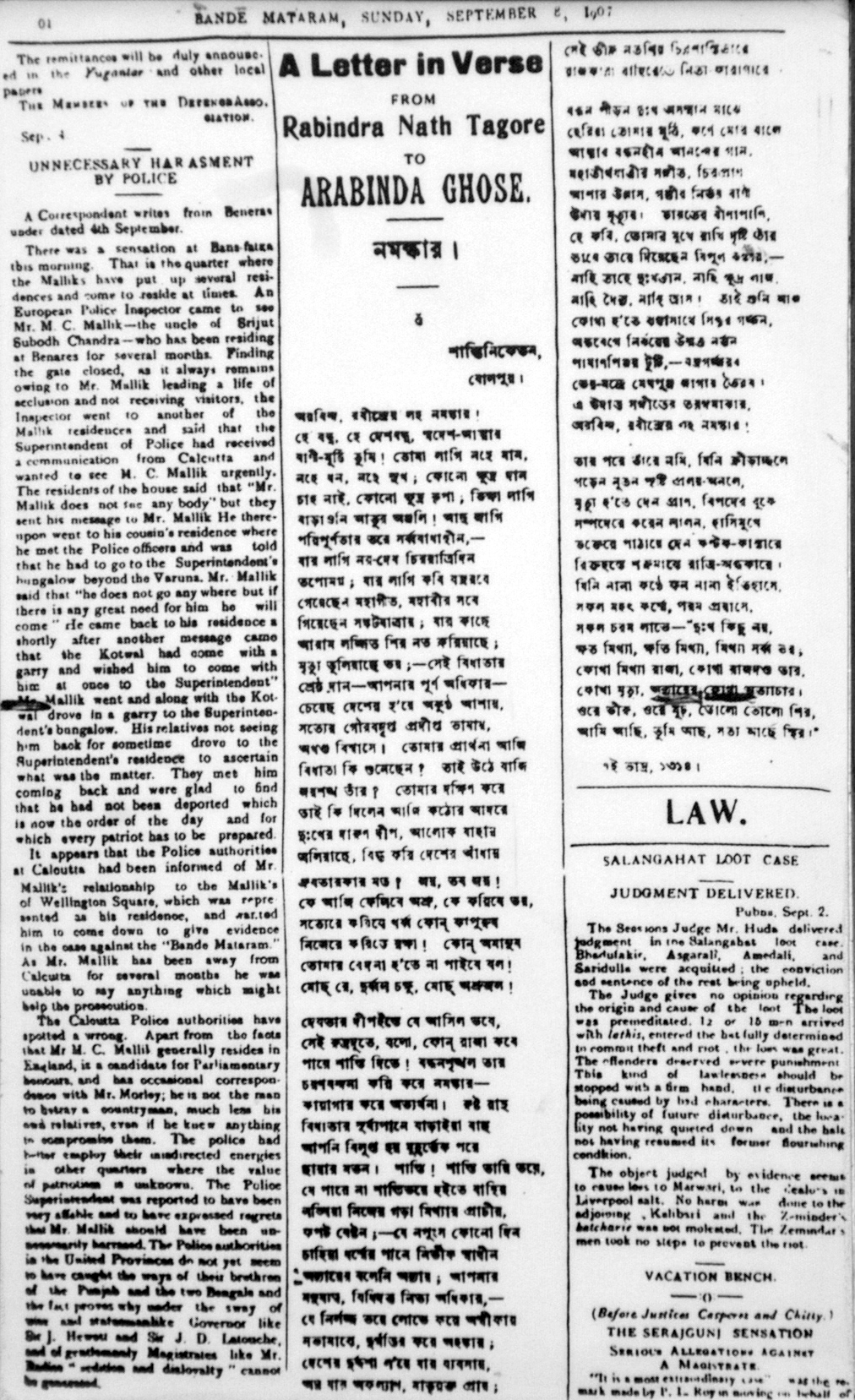Namashkar
Poem by Rabindranath
Rabindranath, O Aurobindo, bows to thee!
O friend, my country's friend, O voice incarnate, free,
Of India's soul! No soft renown doth crown thy lot,
Nor pelf or careless comfort is for thee; thou'st sought
No petty bounty, petty dole; the beggar's bowl
Thou n'er hast held aloft. In watchfulness thy soul
Hast thou e'er held for bondless full perfection's birth
For which, all night and day, the god in man on earth
Doth strive and strain austerely; which in solemn voice
The poet sings in thund'rous poems; for which rejoice
Stout hearts to march on perilous paths; before whose flame
Refulgent, ease bows down its head in humbled shame
And death forgetteth fear; - that gift supreme
To thee from Heaven's own hand, that full-orb'd fadeless dream
That's thine, thou'st asked for as thy country's own desire
In quenchless hope, in words with truth's white flame afire,
In infinite faith, hath God in heaven heard at last
This prayer of thine ? And so, sounds there, in blast on blast,
His victory-trumpet? And puts he, with love austere,
In thy right hand, today, the fateful lamp and drear
Of sorrow, whose light doth pierce the country's agelong gloom,
And in the infinite skies doth steadfast shine and loom,
As doth the Northern star ? O Victory and Hail !
Where is the coward who will shed tears today, or wail
Or quake in fear? And who'll belittle truth to seek
His own small safety? Where's the spineless creature weak
Who will not in thy pain his strength and courage find ?
O wipe away those tears, O thou of craven mind !
The fiery messenger that with the lamp of God
Hath come - where is the king who can with chain or rod
Chastise him? Chains that were to bind salute his feet,
And prisons greet him as their guest with welcome sweet,
The pall of gloom that wraps the sun in noontide skies
In dim eclipse, within a moment slips and flies
As doth a shadow. Punishment? It ever falls
On him who is no man, and every day hath feared,
Abashed, to gaze on truth's face with a free man's eye
And call a wrong a wrong; on him who doth deny
His manhood shamelessly before his own compeers,
And e'er disowns his God-given rights, impelled by fears
And greeds; who on his degradation prides himself,
Who traffics in his country's shame; whose bread, whose pelf
Are his own mother's gore; that coward sits and quails
In jail without reprieve, outside all human jails.
When I behold thy face, 'mid bondage, pain and wrong
And black indignities, I hear the soul's great song
Of rapture unconfined, the chant the pilgrim sings
In which exultant hope's immortal splendour rings,
Solemn voice and calm, and heart-consoling, grand
Of imperturbable death, the spirit of Bharat-Iand,
O poet, hath placed upon thy face her eyes afire
With love, and struck vast chords upon her vibrant lyre, -
Wherein there is no note of sorrow, shame or fear,
Or penury or want. And so today I hear
The ocean's restless roar borne by the stormy wind,
Th' impetuous fountain's dance riotous, swift and blind
Bursting its rocky cage, - the voice of thunder deep
Awakening, like a clarion call, the clouds asleep.
Amid this song triumphant, vast, that encircles me,
Rabindranath, O Aurobindo, bows to thee!
And then to Him I bow Who in His sport cloth make
New worlds in fiery dissolution's awful wake,
From death awakes new life; in danger's bosom rears
Prosperity; and sends his devotee in tears,
'Mid desolation's thorns, amid his foes to fight
Alone and empty-handed in the gloom of night;
In diverse tongues, in diverse ages speaketh ever
In every mighty deed, in every great endeavour
And true experience: "Sorrow's naught, howe'er drear,
And pain is naught, and harm is naught, and naught all fear;
The king's a shadow, - punishment is but a breath;
Where is the tyranny of wrong, and where is death?
O fool, O coward, raise thy head that's bowed in fear,
I am, thou art, and everlasting truth is here!"
The English translation by Kshitish Chandra Sen, was first published in the
"Sri Aurobindo Mandir Annual", Calcutta in 1944.


Namaskar to Sri Aurobindo
From Rabindranath Tagore